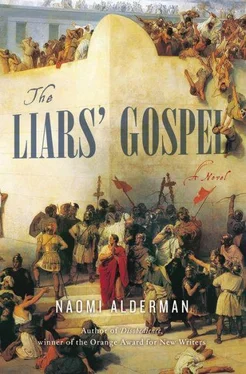They bury Av-Raham just before sunset and stand weeping over his grave for a long time. Bar-Avo lingers after the other men have departed, wanting to wring some final wisdom out of the dry earth. It is for him now to decide how to prosecute the ongoing war.
He says, “They captured me. They have spies among our ranks. If we push on we may perish and be defeated.”
And from the grave he hears Av-Raham’s voice and smells the man’s scent, the smoke and the mild smell of frying onions: “Better perish than live under occupation. Better every man dead than that.”
Bar-Avo is pragmatic. He knows that the dead often appear in dreams and visions, that just because you think you have smelled the scent of a man’s clothes after he has died does not mean that you should do what that voice tells you.
Pilate is mobilizing his forces, striking back at the “bandits” who have harried his supply lines for months. It might be a time to retreat, to scatter the men to their homes and wait for the crackdown to end. It is not Bar-Avo’s decision alone, but he is part of the decision. He says no, tell the men to come to the city even still. If there is no fight there will at least be a mighty demonstration of anger. We are ready now, or we will soon be ready. The people want to overthrow the Romans.
And he is right that the city is ready to burn. That is the riot over the money for the aqueduct. Six hundred people die in the public square.
Bar-Avo is not one of them, though he sees his friends cut down, and women, and children. His own son, still just a boy, might have been one of them if he, Bar-Avo, had not gathered him into the folds of his cloak and broken through the Roman line using his teeth to tear at the soldier holding him back, bringing up his mouth red and with a chunk of the man’s face warm and bleeding in his mouth.
Men and women and children. It is the smell Bar-Avo remembers most as the years cloud up his memory of precisely how he escaped and who he left behind to die when he ran.
Bar-Avo pricks himself with this memory when he grows weak, when his heart says for any moment “enough.” It will never be enough until they have rid the land of every Roman on it. It will never be enough.
And perhaps on the same day that Bar-Avo decides this, Pilate begins to think to himself: so many dead, and still the thing is not concluded? Perhaps he does think so, there is no way to be certain.
And then it is the last days of summer and the wheat is high, and then it is autumn when the fruit trees bring forth their goodness, and then it is winter when the winds howl, and then it is spring again and the earth which has died is reborn. And ten years can go past like this quickly and they continue the fight.
Pilate is finally ordered home to Rome after one massacre too many, and there is some brief rejoicing. It is true that he has killed many thousands of Jews, that his men have left the city worse and more afraid and more angry than it has ever been, but at last he is gone, and perhaps this is hopeful.
In Rome the old goat Emperor Tiberius dies and a new emperor ascends to rule. His name is Little Boots and he is full of the promise of a new era of tolerant understanding, but it falls out that he is madder than his predecessor and the name Caligula is soon a byword for cruelty and sickness. Caligula believes he is a god — though the people of Judea already know that no man can ever be a god — and sees no reason, as a god, to keep to the old compacts between Rome and Jerusalem. He orders his statue to be placed in the holy Temple. His generals attempt to explain to him that the Jews will rebel, that this has been tried before, that they would have to kill every man in the city to make this happen.
“Then kill every man in the city,” Caligula says. Or something similar to that. Or something as unconcerned as that, at least.
Caligula’s madness has encircled him so that although he rules an empire as wide as any ever known, he is entrapped within the labyrinth of his own mind. He cannot see beyond the horizons of his own loves and hatreds, his own family, his own cock. He fucks his sister, they say, and makes his horse a consul, and when his sister falls pregnant he cuts the unborn child out of her belly.
In Jerusalem the new prefect, Marullus, attempts to place the statue. And the anticipated consequences come to pass.
Bar-Avo has three thousand men under his orders now in Jerusalem alone, and more importantly the people are with them, the households give them shelter, the young men come to fight with them. This statue of the Emperor Caligula, his nose upturned to the heaven, a laurel wreath on his mad brow, is too much for the people of Judea to tolerate and the High Priest cannot convince them, does not even try to do so. Caiaphas is gone now, and it is another of Annas’s sons who meets with Prefect Marullus to say, “Not this, not this, there will be no way to stop the killing.” But the Prefect, even if he were the best man in the Empire, would have to obey the commands of his God-Emperor.
Caligula has set himself against the God of Israel. Upon Him particularly and necessarily, for both are jealous gods. All the people who will have to die to wage that war of god on God are insignificant.
Massacres and riots and rebellions and battles are nothing new now. Mothers sharpen weapons for their sons. Grandparents shelter fleeing rebels, saying, “He was never here, we have seen no one.” Men are slaughtered in the noonday square and their bellies sliced open so that their entrails slide out glistening as they yet scream. There is death upon death, and though it never starts to feel easy, it begins to feel expected. The land is becoming accustomed to living this way.
For every Roman excess there is a rebellion. Every rebellion is put down with increasing brutality. Every act of brutality hardens the people a little further, making the next uprising more violent. Every act of violence justifies a more extreme show of force in suppressing it. There are fewer and fewer people among the Jews who trust Rome at all. Even to speak of trusting Rome now, of wanting peace with Rome, is to forget the murdered sons, the repulsive statues in the Temple, the men with daggers concealed in their cloaks. The thing has no end. Or no end but one.
Bar-Avo sidles up to a man in the marketplace. Who is he? A baker, by the scent of him and the flour dusting his drawstring trousers and his leather shoes. Bar-Avo has never seen him before. He probably does not deserve to die. There is a crumb of dandruff above his ear. The back of his neck is red from too much sun. He has a hot boil starting just above the place where his tunic rubs his neck. Some woman probably loves this breathing body, or is used to it at least. Some woman would have a hot compress with fragrant herbs to draw the poison out of that boil this evening after his work is done. He should not have come here to stand in the marketplace.
To do good, sometimes, one must do evil. He reminds himself that this honest baker has paid his taxes like a good citizen of Rome. That perhaps he sends loaves to the Roman garrison or to the Prefect. That he collaborates, over and over again, just by living in the city and not rising up against them.
Bar-Avo’s cloak flows around him in loose, deep folds. Within the cloak is the dagger. The crowd surges and bounces. There are sizzling scents of freshly cooked meat from the stalls. People are loud, shouting for attention from stallholders, watching out for the thieving hands of small children, demanding from one another where they need to go next and have they tried yet the bread with dill, the cheese, the wine, the garlic, the oil? He waits until a surge pushes him forward into the baker.
They learned the lesson Pilate taught them extremely well. Pilate understood the methods of terror. Pilate is no longer the prefect, but his methods are still effective.
Читать дальше












